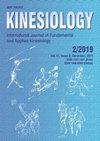Energy expenditure and dietary intake of female collegiate tennis and soccer players during a competitive season
IF 0.9
4区 医学
Q4 REHABILITATION
引用次数: 5
Abstract
This study examined energy expenditure, dietary behavior, and energy balance of female tennis and soccer student-athletes during a competitive season. A sample of 18 (Mage=19.86±1.35 years) Division I female collegiate student-athletes (5 tennis and 13 soccer players) were followed for four days, i. e., during one game/match, two practice sessions, and one recovery day. Physical activity was assessed with accelerometers and dietary behavior with daily food logs. Daily energy expenditure for the game/match, practice, and rest days was 2,848±304kcal, 2,622±248kcal, and 1,833±959kcal, respectively, with a statistically significant main effect (F[2,16]=82.291, p<.001, η2=.91). Daily dietary intake ranged from 1,833±959 to 1849±371kcal, with no significant interaction between different days. There were no sport specific differences in energy expenditure or dietary behaviors. Athletes consumed 4.30±2.07 g/kg carbohydrates, 1.57±.98 g/kg protein, and 1.27±.80 g/kg fats daily. There was a significant main effect in dietary intake (F[2,16]=7.311, p=.006, η2=.48), with a difference between game/match and recovery days (t[17]=3.83, p=.001, d=1.19). This study showed a negative energy balance among female student-athletes. The findings indicate that the lack of carbohydrate intake during game/match days contributed to this energy deficit.女子大学网球和足球运动员在竞技赛季的能量消耗和饮食摄入
这项研究调查了女子网球运动员和社会学生运动员在比赛季节的能量消耗、饮食行为和能量平衡。对18名(Mage=19.86±1.35岁)一级女子大学生运动员(5名网球运动员和13名足球运动员)进行了为期四天的随访,即一场比赛/比赛、两次练习和一天恢复期。用加速度计评估身体活动,用每日食物日志评估饮食行为。比赛、训练和休息日的每日能量消耗分别为2848±304kcal、2622±248kcal和1833±959kcal,具有统计学显著的主效应(F[2,16]=82.291,p<.001,η2=.91)。在能量消耗或饮食行为方面没有运动特有的差异。运动员每天摄入4.30±2.07克/公斤碳水化合物、1.57±.98克/公斤蛋白质和1.27±.80克/公斤脂肪。饮食摄入有显著的主效应(F[2,16]=7.311,p=0.006,η2=.48),比赛/比赛和恢复天数之间有差异(t[17]=3.83,p=0.001,d=1.19)。本研究表明,女性运动员的能量平衡为负。研究结果表明,比赛/比赛日缺乏碳水化合物摄入是造成这种能量不足的原因之一。
本文章由计算机程序翻译,如有差异,请以英文原文为准。
求助全文
约1分钟内获得全文
求助全文
来源期刊

Kinesiology
REHABILITATION-SPORT SCIENCES
CiteScore
1.90
自引率
8.30%
发文量
16
审稿时长
>12 weeks
期刊介绍:
Kinesiology – International Journal of Fundamental and Applied Kinesiology (print ISSN 1331- 1441, online ISSN 1848-638X) publishes twice a year scientific papers and other written material from kinesiology (a scientific discipline which investigates art and science of human movement; in the meaning and scope close to the idiom “sport sciences”) and other adjacent human sciences focused on sport and exercise, primarily from anthropology (biological and cultural alike), medicine, sociology, psychology, natural sciences and mathematics applied to sport in its broadest sense, history, and others. Contributions of high scientific interest, including also results of theoretical analyses and their practical application in physical education, sport, physical recreation and kinesitherapy, are accepted for publication. The following sections define the scope of the journal: Sport and sports activities, Physical education, Recreation/leisure, Kinesiological anthropology, Training methods, Biology of sport and exercise, Sports medicine and physiology of sport, Biomechanics, History of sport and Book reviews with news.
 求助内容:
求助内容: 应助结果提醒方式:
应助结果提醒方式:


